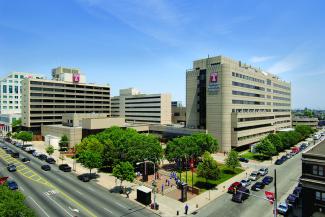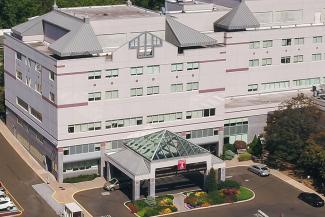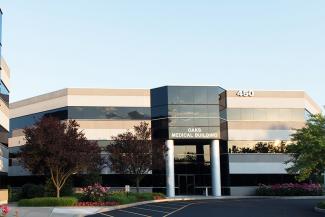In lung volume reduction surgery, the parts of the lung most damaged by severe emphysema are removed. Usually, about 20% to 35% of each lung is taken out. This "volume reduction" allows the remaining lung to fill and empty more completely with each breath. As a result, patients can breathe more deeply and get more oxygen.
Lung Volume Reduction Surgery (LVRS)
Criteria
Certain patients with severe emphysema — a type of chronic obstructive pulmonary disease (COPD) — will benefit from LVRS. This surgery is only appropriate for patients with certain X-ray patterns of emphysema and exercise performance. Also, lung volume reduction surgery is only for those without special risks such as:
- Advanced age
- Excess body weight
- Malnourishment
- Pulmonary hypertension
- Lung test results indicating extremely severe or complex disease
A Certified Center for Lung Volume Reduction Surgery
We are proud to be one of the nation's first Joint Commission-certified centers for lung volume reduction surgery. Our LVRS program was awarded this Certificate of Distinction by the Joint Commission on Accreditation of Healthcare Organizations for safety and quality of care.
The Temple Lung Center is home to one of the nation's most experienced LVRS programs. We have treated hundreds of patients with this pulmonary surgery. We have also participated in the landmark National Emphysema Treatment Trial (NETT), which proved that LVRS definitely helps some patients with severe emphysema.
Based on our long experience and good results with LVRS, Temple is now one of the few Medicare-qualified sites for this special procedure.
Benefits and Risks of LVRS
After LVRS, most patients breathe more easily and lose that frightening feeling of being unable to take a full deep breath. Patients usually can walk farther and faster than before the surgery. In general, they have a better quality of life.
Since LVRS is major surgery, some temporary pain and discomfort is involved. Over the long term, survival improves, but there is a risk of death due to surgery. In one large national study, the overall risk of death in the 3 months after surgery was 3%.
The main complication after surgery is an air leak. Other possible complications include:
- Infections at the incision site
- Fever
- Pneumonia
- Rapid/irregular heartbeat
- Heart attack
The "SEE First" Program
Patients referred to Temple undergo physical examinations and numerous tests to see if LVRS is right for them.
The Severe Emphysema Evaluation (SEE) is done first — before surgery or any other new treatment is considered. Your local pulmonologist may do some exams and screening tests, but many take place at Temple. The tests include:
- Lung scan
- Chest X-ray
- CT (computed tomography) scan
- Spirometry and other lung function tests
- Exercise challenge
- Electrocardiogram (ECG) and echocardiogram of the heart
- Blood tests
What to Expect If You Qualify for LVRS
If these tests show that you're a candidate for LVRS, then you will participate in 16-20 formal 2-hour sessions of pulmonary rehabilitation. Follow-up testing is done after this 6-to 10-week rehab program. Only patients who still qualify after rehabilitation and re-testing enter the final preparation phase for LVRS.
You will then meet with the surgeon, anesthesiologist and other pulmonary doctors and nurses to prepare for surgery. The surgery itself can be open chest (median sternotomy) or less invasive (video-assisted thoracic surgery).
After being discharged from the hospital, patients participate in at least 6 more specially designed 2-hour pulmonary rehabilitation sessions. LVRS can improve breathing and enhance quality of life for many with severe emphysema.
If You're Not a Candidate
Some patients who go through this "SEE First" program will not qualify for LVRS. In fact, many patients start feeling better due to the effects of pulmonary rehabilitation.
For patients not getting LVRS, Temple physicians can offer other advanced therapies including lung transplantation or, in some cases, access to lung clinical trials of new drugs or devices. All the test results help in choosing the best treatment option.
Ready for an Appointment?
Find a pulmonologist near you, request an appointment, or call 800-TEMPLE-MED (800-836-7536) today.
Lung volume reduction surgery is performed at Temple University Hospital – Main Campus, but patients can choose to be evaluated at Temple University Hospital – Jeanes Campus.
Our Locations
The locations listed below are physician practices on Temple Health campuses. For a full list of providers, go to our Find a Doctor search.


